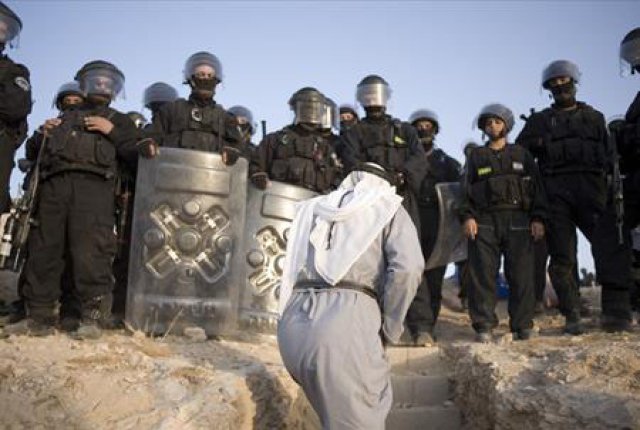
Early on July 27, Israeli bulldozers, flanked by helicopters and throngs of police, demolished the entire Bedouin village of al Araqib in the northern Negev desert. Despite having land rights cases pending in the court system, hundreds of al Araqib villagers were instantly made homeless a month after Israeli police posted demolition orders.
Eyewitness reports say the police were accompanied by several busloads of right-wing Israeli civilians who cheered during the demolitions.
Dr Yeela Ranaan of the Regional Council for Unrecognised Villages (RCUV) in the Negev, was in al Araqib during the demolitions.
“Approximately 1500 Israeli police came at 5.30 in the morning and evacuated everyone from their beds”, Ranaan told the Electronic Intifada.
“They brought tear gas and water cannons, but didn't use them. There was a handful of Israeli peace activists who had come the night before to stay with the villagers, and the police beat them up and detained them.
“Once they evacuated everyone in the village, they started to demolish it. It took three hours to flatten the village. For the people of al Araqib, it was a nightmare to see their village destroyed.”
Since the establishment of the State of Israel in 1948, al Araqib villagers have been fighting for recognition in the courts.
Ranaan told the Electronic Intifada that in the early 1950s, after they were forcefully expelled from their land by Israeli forces, villagers were fined for “trespassing” in their own homes by the Israeli government.
Israel has refused to acknowledge villagers' land deeds and receipts of land taxes paid to the Ottoman authorities well before Israel's establishment.
“As we speak, the fate of al Araqib hasn't been decided in a court”, Ranaan said. “Despite this, Israel came and demolished the homes. Israel is not just changing the facts on the ground, it's erasing them.”
More than 110,000 Palestinian Bedouin live in dozens of so-called “unrecognised villages” throughout the State of Israel, and nearly 80% live in the Negev. Since 1948, Israel has refused to acknowledge the villages and denied basic services such as water, electricity, roads, schools and waste management.
During the demolitions, Sulaiman abu Mdian, a 29-year-old father of four who works as a chicken farmer, told CNN that Israel “is treating us like cockroaches”.
An RCUV press release admonished the Israeli government for its policies of accelerating home demolitions against Palestinian Bedouin communities across the state.
“The destruction's declared aim is to facilitate plans by the Jewish National Fund to plant a [forest] on the site”, the RCUV said.
“We regard this demolition as a criminal act. Bedouin citizens of Israel are not enemies, and forestation of the Negev is not a reasonable pretext for destroying a community which is more than 60 years old, dispossessing its residents and violating the basic rights of hundreds of Israeli civilians, men, women and children.”
The statement added: “This act cannot be dissociated from yesterday's statement by Prime Minister [Benjamin] Netanyahu, who at the cabinet meeting sounded a warning about 'a situation in which a demand for national rights will be made from some quarters inside Israel, for example in the Negev, should the area be left without a Jewish majority. Such things happened in the Balkans, and it is a real threat.'
“Presenting the Bedouin citizens of Israel as 'a real threat' gives legitimacy to the expulsion of Israel's Bedouin citizens from the Negev in order to 'Judaize' it. We call on all who care for democracy to give their support to this threatened community.”
Ranaan told the Electronic Intifada that solidarity actions are being planned as villagers of al Araqib set up temporary housing on their land. “They already put up a few tents, and they'll be staying at different locations until every family will put up a makeshift home on their land”, she said.
“But they know that their homes will be demolished again and again. People should put pressure on the Israeli government. International pressure is important.”
[Abridged from Electronic Intifada.]